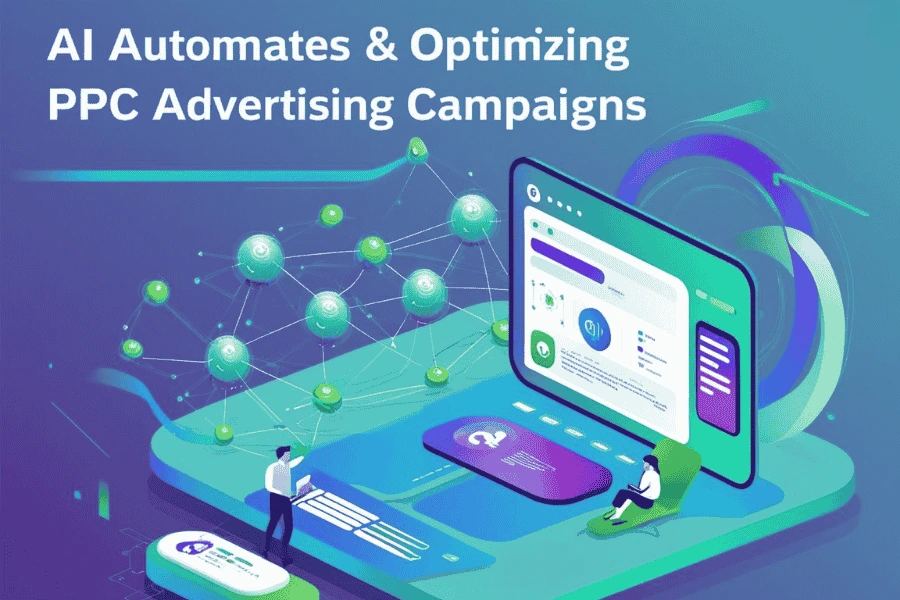AI in PPC Advertising: Automating and Optimizing Campaigns
AI in PPC Advertising: Automating and Optimizing Campaigns
In the high-stakes world of Pay-Per-Click (PPC) advertising, speed, accuracy, and data-driven decision-making are key to success. As digital competition intensifies, advertisers are turning to Artificial Intelligence (AI) to take their campaigns to the next level. From smart bidding to dynamic ad copy creation, AI is redefining how marketers manage and optimize PPC campaigns across platforms like Google Ads, Bing, and Meta.

What is AI in PPC Advertising?
AI in PPC advertising refers to the use of machine learning algorithms and automation tools to manage, analyze, and improve paid search and display advertising campaigns. It reduces the need for manual adjustments by automating tasks such as:
2. Sentiment Analysis
Sentiment analysis is a specific application of NLP that focuses on determining the emotional tone behind a piece of text. AI algorithms analyze customer feedback to classify it as positive, negative, or neutral. Advanced sentiment analysis models go beyond basic polarity detection and can identify more nuanced emotions, such as happiness, frustration, or disappointment. For example, a customer review stating, "The product quality is excellent, but the delivery was slow," contains both positive and negative sentiments. AI can accurately detect and separate these sentiments, providing a more granular understanding of customer feedback.
3. Real-Time Feedback Analysis
AI enables real-time analysis of customer feedback, allowing businesses to respond quickly to emerging issues. By integrating AI systems with customer feedback channels, companies can monitor social media, review sites, and customer service interactions in real time. This immediate analysis helps businesses identify and address problems promptly, improving customer satisfaction and preventing potential crises. For instance, if a sudden spike in negative feedback about a specific product feature is detected, the company can investigate and resolve the issue before it escalates. This proactive approach enhances customer trust and loyalty.
4. Scalability and Efficiency
Traditional methods of customer feedback analysis involve manual data processing, which is time-consuming and prone to errors. AI automates this process, significantly increasing efficiency and scalability. AI can handle large volumes of feedback from multiple sources simultaneously, providing quick and accurate insights. Businesses can thus allocate their resources more effectively, focusing on strategic decision-making rather than manual data analysis. The scalability of AI ensures that as the volume of customer feedback grows, the analysis remains consistent and reliable.
5. Data-Driven Decision Making
AI-generated insights from customer feedback provide a solid foundation for data-driven decision-making. By understanding customer sentiment and feedback trends, businesses can make informed decisions about product development, marketing strategies, and customer service improvements. For example, if sentiment analysis reveals widespread dissatisfaction with a particular feature, the company can prioritize its enhancement in the next product update. Similarly, identifying positive sentiments can help highlight successful aspects of a product or service, guiding future marketing efforts.
6. Enhanced Customer Experience
Ultimately, the automation of customer feedback analysis and sentiment detection leads to an enhanced customer experience. By addressing customer concerns swiftly and effectively, businesses can improve customer satisfaction and loyalty. Personalized responses to feedback, made possible by AI, show customers that their opinions are valued, further strengthening their relationship with the brand. AI's application in automating customer feedback analysis and sentiment detection offers significant advantages, including real-time analysis, scalability, efficiency, and data-driven decision-making. By leveraging NLP and sentiment analysis, businesses can gain deep insights into customer emotions and opinions, enabling them to enhance products, services, and overall customer experience. This strategic use of AI not only streamlines feedback processing but also fosters a customer-centric approach that drives long-term success.
Active Events
Navigating the World of SERP Features: Tips, Tricks, and Strategies
Date: Aug 07, 2025 | 7:00 PM(IST)
7:00 PM(IST) - 8:10 PM(IST)
2811 people have registered
3 Must Have Projects On your CV to Get into Data Analysis
Date: Aug 05, 2025 | 7:00 PM(IST)
7:00 PM(IST) - 8:10 PM(IST)
2753 people have registered
Bootcamps
Digital Marketing Bootcamp
- Duration:4 Months
- Start Date:Aug 09, 2025
Data Analyst Bootcamp
- Duration:4 Months
- Start Date:Aug 09, 2025
